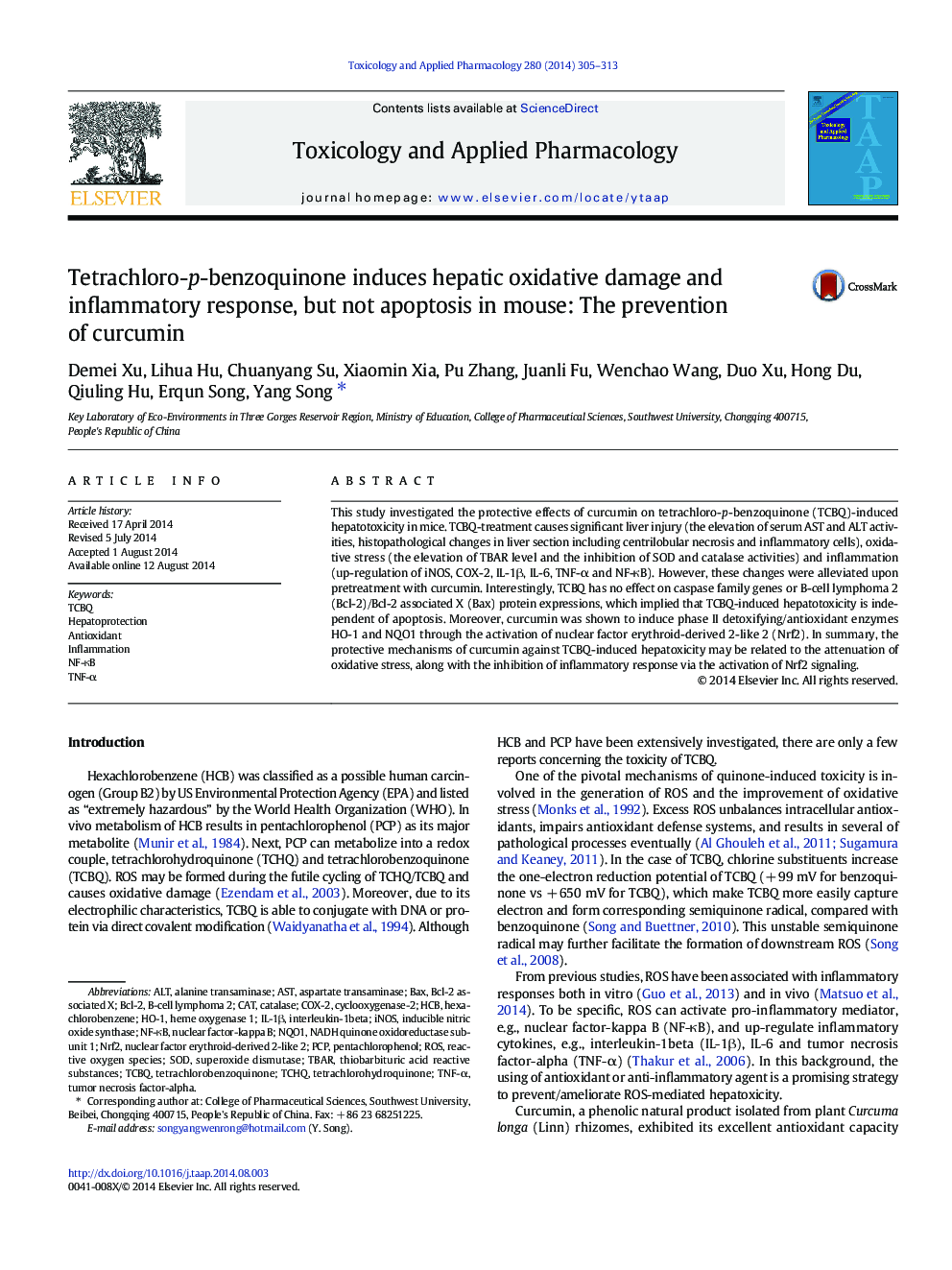| کد مقاله | کد نشریه | سال انتشار | مقاله انگلیسی | نسخه تمام متن |
|---|---|---|---|---|
| 5846232 | 1128462 | 2014 | 9 صفحه PDF | دانلود رایگان |
عنوان انگلیسی مقاله ISI
Tetrachloro-p-benzoquinone induces hepatic oxidative damage and inflammatory response, but not apoptosis in mouse: The prevention of curcumin
دانلود مقاله + سفارش ترجمه
دانلود مقاله ISI انگلیسی
رایگان برای ایرانیان
کلمات کلیدی
Bcl-2 associated XCATNQO1HO-1COX-2Bcl-2iNOSALTNF-κBHCBIL-1βAST - آسپارتات ترانس آمینازalanine transaminase - آلانین ترانس آمینازinterleukin-1beta - اینترلوکین-1 بتاBax - باکسHexachlorobenzene - بنزن هگزاکلراید، هگزاکلروبنزنaspartate transaminase - ترانس آمیناز آسپارتاتinducible nitric oxide synthase - سنتاز اکسید نیتریک القاییCyclooxygenase-2 - سیکلوکوکسیژناز2Nuclear factor-kappa B - فاکتور هسته ای-کاپا BB-cell lymphoma 2 - لنفوم سلول B 2heme oxygenase 1 - همای اکسیژناز 1Catalase - کاتالاز
موضوعات مرتبط
علوم زیستی و بیوفناوری
علوم محیط زیست
بهداشت، سم شناسی و جهش زایی
پیش نمایش صفحه اول مقاله

چکیده انگلیسی
This study investigated the protective effects of curcumin on tetrachloro-p-benzoquinone (TCBQ)-induced hepatotoxicity in mice. TCBQ-treatment causes significant liver injury (the elevation of serum AST and ALT activities, histopathological changes in liver section including centrilobular necrosis and inflammatory cells), oxidative stress (the elevation of TBAR level and the inhibition of SOD and catalase activities) and inflammation (up-regulation of iNOS, COX-2, IL-1β, IL-6, TNF-α and NF-κB). However, these changes were alleviated upon pretreatment with curcumin. Interestingly, TCBQ has no effect on caspase family genes or B-cell lymphoma 2 (Bcl-2)/Bcl-2 associated X (Bax) protein expressions, which implied that TCBQ-induced hepatotoxicity is independent of apoptosis. Moreover, curcumin was shown to induce phase II detoxifying/antioxidant enzymes HO-1 and NQO1 through the activation of nuclear factor erythroid-derived 2-like 2 (Nrf2). In summary, the protective mechanisms of curcumin against TCBQ-induced hepatoxicity may be related to the attenuation of oxidative stress, along with the inhibition of inflammatory response via the activation of Nrf2 signaling.
ناشر
Database: Elsevier - ScienceDirect (ساینس دایرکت)
Journal: Toxicology and Applied Pharmacology - Volume 280, Issue 2, 15 October 2014, Pages 305-313
Journal: Toxicology and Applied Pharmacology - Volume 280, Issue 2, 15 October 2014, Pages 305-313
نویسندگان
Demei Xu, Lihua Hu, Chuanyang Su, Xiaomin Xia, Pu Zhang, Juanli Fu, Wenchao Wang, Duo Xu, Hong Du, Qiuling Hu, Erqun Song, Yang Song,